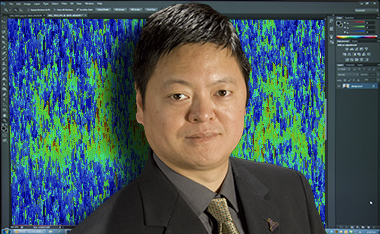UAlbany Computer Scientist Receives Prestigious NSF Award to Detect Noise in Digital Signaling
 |
|
UAlbany Computer Scientist Siwei Lyu will conduct research on characterizing "noise" in digital images or audio signals. (Photo by Mark Schmidt)
|
ALBANY, N.Y. (August 9, 2013) -- University at Albany Computer Scientist Siwei Lyu will conduct research on characterizing "noise" in digital images or audio signals.
The study’s results will be applied to a wide range of fields where digital signal processing plays an important role, including forensic science, media imaging, wireless communications and neuroscience."
Lyu is renowned nationally for analyzing image and voice data.
This latest project is supported by a three-year, $400,000 National Science Foundation (NSF) grant and will focus on estimating parameters of the random noise model directly from a noise corrupted signal.
The study could have broad applications in the following diverse industries:
• Forensics: The analysis of imagery, where discriminating low and high local noise levels can be used to detect forgeries generated by compositing two different digital images.
• Medical Imaging: Removing noise in MRI imaging could help reduce the exposure of the patient to radioactivity.
• Wireless Communication: Finding varying noise levels in radio networks would lead to more efficient use of bandwidth resources.
• Neuroscience: Estimating changing background noise levels can help to better process neural recordings (spike trains) from sensory neurons.
While the quality and sophistication of modern digital information processing has improved in recent years, a detriment to signaling is noise, defined roughly as digitalized information irrelevant to the particular task.
"An understanding and estimation of digital noise helps us to better understand the useful information, and to improve the design of the corresponding information processing systems," Lyu said. "However, we rarely have the chance of seeing the noise separately, but rather have to untangle the noise from a signal it corrupted. Our method is to characterize the noise directly from such signals, so that algorithms that need to have the noise removed or reduced can become more reliable. Because of the ubiquity of noise, this work may have many practical applications in different fields of signal processing and computational sciences."
Lyu is the recipient of several research grants, including the highly competitive Faculty Early Career Development (CAREER) Award from the National Science Foundation (NSF), a five year, $500,000 grant to develop new methods to detect altered or faked digital images.
![]() For more news, subscribe to UAlbany's RSS headline feeds
For more news, subscribe to UAlbany's RSS headline feeds
A comprehensive public research university, the University at Albany-SUNY offers more than 120 undergraduate majors and minors and 125 master's, doctoral and graduate certificate programs. UAlbany is a leader among all New York State colleges and universities in such diverse fields as atmospheric and environmental sciences, business, education, public health,health sciences, criminal justice, emergency preparedness, engineering and applied sciences, informatics, public administration, social welfare and sociology, taught by an extensive roster of faculty experts. It also offers expanded academic and research opportunities for students through an affiliation with Albany Law School. With a curriculum enhanced by 600 study-abroad opportunities, UAlbany launches great careers.


